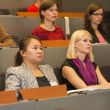Managing African agriculture: markets, linkages and rural economic development
Now seen as an established series of international research conferences, MSM’s 5th annual Maastricht-based research conference continues to attract leading scholars and is the scene for controversial discussions. Co-organised by the Austrian Foundation for Development Research and the German Development Institute, participants at this year’s conference on 4 September 2015 heard and presented a total of 15 papers on one day – some as plenary sessions and some in parallel sessions.

Of great interest at the kick-off was Dr. Luc Christiaensen, a Lead Economist at the World Bank. Always provocative, he started by trying to separate the myths and realities prevalent about agriculture in Africa. In particular, received wisdom states that 60-80% of agricultural labour in Sub-Saharan Africa is typically female. Who says? A monograph of 1972, which does not quote sources. It may be more like 40%. But it’s impossible to generalise about a coun
try as diverse as Africa, even as diverse as Sub-Saharan Africa. Country-level factors would seem to be most crucial, so regions close to borders often produce agricultural results, which look like outliers to the rest of the country. It is often the case that some regions have inorganic fertilizers, use irrigation and have access to improved seed varieties, but not always do all three occur together. Again, it varies country by country.
The next keynote speaker, Dr. Christopher Gilbert of the SAIS Bologna Center of Johns Hopkins University, added further controversy by
 introducing the debate about seasonality in African agriculture – is there or isn’t there? Some countries and some crops have; others haven’t. It can be like reading the tea leaves! In Africa few families can store surplus supplies, financial credit institutions are under-developed so trading is restricted, so families may simply eat well some months and less well the rest of the year. This can make a difference to the health and life expectancy of children born in specific months – birth month and child health is an important causal area for study. There could be some chicken-and-egg issues here – the better-off farmers produce coffee, or they become better off by producing coffee? The debates continue…
introducing the debate about seasonality in African agriculture – is there or isn’t there? Some countries and some crops have; others haven’t. It can be like reading the tea leaves! In Africa few families can store surplus supplies, financial credit institutions are under-developed so trading is restricted, so families may simply eat well some months and less well the rest of the year. This can make a difference to the health and life expectancy of children born in specific months – birth month and child health is an important causal area for study. There could be some chicken-and-egg issues here – the better-off farmers produce coffee, or they become better off by producing coffee? The debates continue…
Other speakers looked again in more detail at issues already flagged in the keynote addresses, such as rural self-employment; the use of irrigation and fertilizers; spatial proximity to markets and borders; and financial issues such as forms of finance in rural development. In further sessions, speakers considered the role of value chains, and looked at commodity exchanges, trade, and exports. Examples were quoted from across Sub-Saharan Africa, including South Africa, Niger, Malawi, Ethiopia and Nigeria. Speakers came from the sponsoring institutions, and many others were from nearby seats of learning, such as Rotterdam School of Management, the Free University in Amsterdam, Szent Istvan University in Hungary, and from Tilburg, Wageningen and UNU-MERIT in Maastricht. Others were based in Africa itself, from North-West University in South Africa, from the University of Abomey Calavi in Benin, and from the International Food Policy Research Institute in Addis Ababa.
 |
 |
MSM faculty presented papers, managed sessions and chaired presentations throughout the day of the conference; special mention must be made of MSM Dean, Prof. Wim Naudé, Dr. Jeroen van Wijk, Dr. Diederik de Boer, Prof. Nicola Dimitri and Prof. Meine Pieter van Dijk.
We are already looking forward to next year!
Related reading
Event: Research Conference: Managing African Agriculture: markets, linkages and rural economic development
Managing African Agriculture: Register now!
Entrepreneurship development in Ethiopia
Managing change is a challenge in all corners of the world

